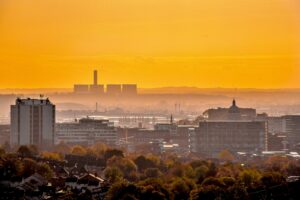Nottingham City Council’s new plan to tackle air pollution in the city centre has been rubber-stamped by the Government.
For the past three years, the council has been working with officials from Defra and the Department for Transport to identify measures to reduce levels of pollution in the shortest possible time and deliver compliance with legal air quality limits.
Nottingham is the first local authority to have their air quality plan approved as part of the government’s wider £3.5bn plan to tackle harmful emissions from road transport across the country. Final plans have also been received from Birmingham and Leeds, while 33 other local authorities are still working to develop theirs.
Environment Minister Thérèse Coffey said: ‘I am delighted to approve Nottingham City Council’s new air quality plan. Air pollution is the top environmental risk to health in the UK and these government-funded plans will clean up the air in the city centre, protecting residents and visitors alike.’
Nottingham’s plan will see the council improving air quality by retrofitting 171 buses with technology to reduce emissions.
The city’s taxi fleet will also be expected to contribute as an ‘age and emissions’ policy for hackney carriages will be introduced along with a £1m grant from government which will be spent on a licensing discount for drivers who use an electric vehicle.
The grant will also be spent on fitting the city centre taxi rank with electric charging points.
The council has also received funding from the Government to support the conversion of its own fleet, including replacing heavy, high polluting vehicles such as bin lorries with electric vehicles.
Cllr Sally Longford, portfolio holder for energy and environment, said: ‘We worked hard on a plan that would reduce air pollution in the shortest possible time for our citizens, and we’re thrilled this has now been agreed, along with nearly £1m funding for extra measures to support taxi drivers.
‘We’re looking forward to progressing these schemes to clean up the city’s buses and taxis, building on our strong track record in improving air quality through investment in sustainable transport, such as the electric tram, our award-winning electric and biogas bus fleets and cycle network.
‘Air pollution is a significant threat to public health today, and road transport emissions are a big part of that. We’re confident we can deliver our plan and go even further to improve the quality of the air in our city.’
A new government air pollution report released last month revealed air pollution in eight local authorities is at dangerous levels.
ClientEarth, which brought the successful legal case against the government which forced them to produce the report, said the revelation showed how the government’s policy of ‘passing the buck’ to local authorities had failed.
















